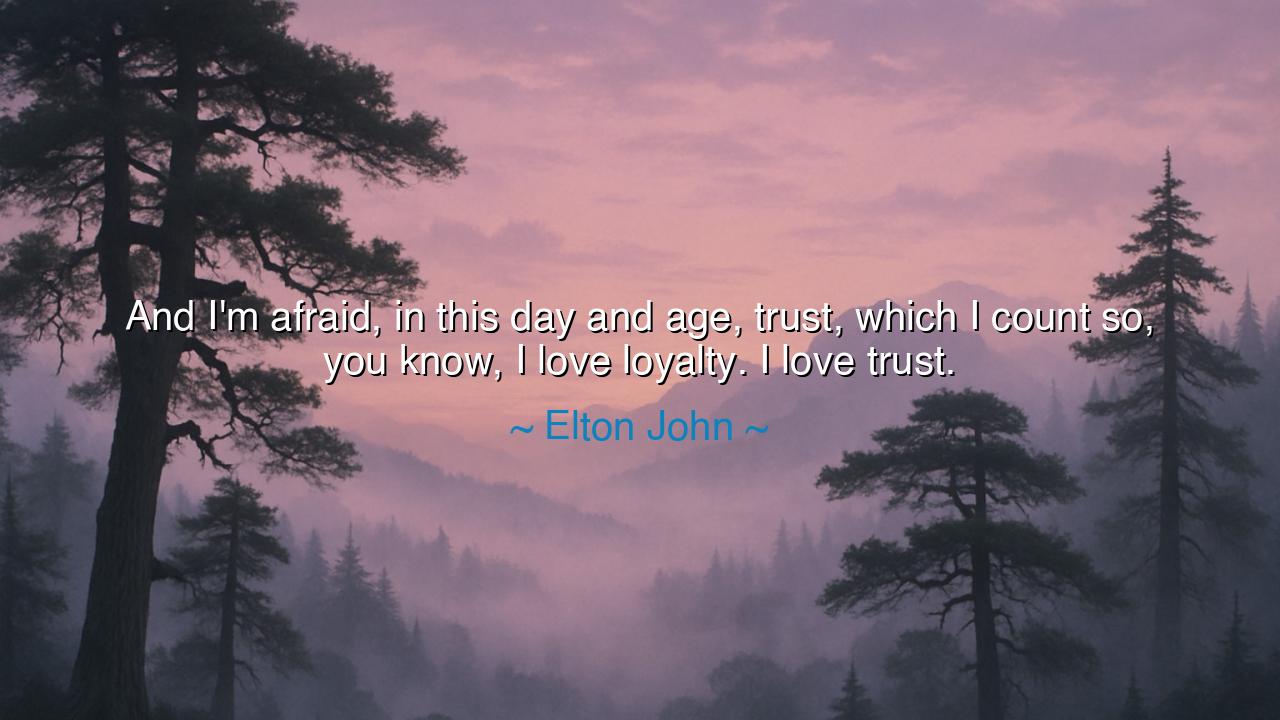
And I'm afraid, in this day and age, trust, which I count so, you
And I'm afraid, in this day and age, trust, which I count so, you know, I love loyalty. I love trust.






"And I'm afraid, in this day and age, trust, which I count so, you know, I love loyalty. I love trust." These words spoken by Elton John resonate deeply in a time when trust and loyalty seem to be in shorter supply than ever before. The modern world, with its rapid pace, technological advances, and shifting moral landscapes, has created an environment where trust is often in jeopardy. John’s reflection captures a growing unease, not just within himself but within society, about the very fabric of relationships—whether personal, professional, or societal. In a world where information flows constantly and intentions are sometimes obscured, trust has become a fragile thing, something that is cherished yet often tested. What John expresses is the agony of living in an age where loyalty seems harder to find, and trust, once freely given, is now something to be earned and, in some cases, even doubted.
In the ancient world, the concept of trust was held in the highest regard. For the Greeks, trust and loyalty were foundational to both personal relationships and the strength of the city-state. Homer’s Iliad tells of warriors who, though bound by honor and a shared purpose, were also deeply concerned with trust and loyalty. Achilles, the greatest of the Greek heroes, withdrew from battle when his trust in his leader, Agamemnon, was broken. The clash between Achilles and Agamemnon is not just a tale of heroic rage but also a profound lesson in the importance of trust in leadership and friendship. The ancients understood that without trust, no society, no bond, could endure. To break trust was to sever the very foundation of relationship and unity.
Yet in modern times, the meaning of trust has become more complicated. Elton John, reflecting on the state of the world, expresses the difficulty of finding genuine loyalty in a society driven by individualism and speed. Technology, for all its marvels, has brought us closer to people across the globe, but it has also created a distance between the depth of connection and the quality of trust. The immediacy of communication, the ease with which we can hide behind screens and names, often distorts the true essence of relationships. In John’s reflection, we see the heartache of someone who has, over the years, learned the value of trust—genuine trust—only to watch it become a rarer commodity in an increasingly transient world.
Consider, O children of wisdom, the life of Cicero, the great Roman orator and philosopher, who believed that trust and loyalty were cornerstones of the Republic. Cicero’s loyalty to the Republic and its values guided much of his career, and he was known for his unwavering commitment to justice and honor. Yet, in his later years, when political betrayals shook the very foundations of Rome, Cicero faced a betrayal of the Republic he had spent his life defending. His inability to maintain trust in his political allies contributed to his tragic demise. Cicero’s story is a reminder that trust can be fragile, and when it is betrayed, it is not just the individual who suffers, but the larger society as well. Elton John, in his own way, echoes this same sentiment—trust, once broken, reverberates across all relationships and structures, be they personal or societal.
In John’s quote, there is an underlying call to action—a longing for a return to authenticity and honesty. The pain he expresses is the pain of modernity itself, where the complexities of our fast-paced, digital world sometimes obscure the simple, but essential, acts of being genuine and trustworthy. The modern struggle for trust is not merely one of doubt but of disconnection—disconnection from the deeper values of loyalty and respect, and the emotional toll that such disconnection brings. As the ancients knew, trust is not something that is freely given without understanding and commitment. It is something that must be earned and maintained, like a delicate thread that holds relationships together.
John’s words challenge us, then, to reflect on the ways in which we relate to others. How often do we offer trust freely, without considering whether the bond is strong enough to withstand the tests of time? How often do we break that trust, whether intentionally or out of neglect, and how do we work to rebuild it? The lesson is clear: to restore trust and loyalty in our relationships, we must be mindful of our actions, ensure that we are living with integrity, and remember that trust is not a given—it is a gift that must be protected and cherished. Trust is a currency more precious than gold, and once spent, it cannot be easily reclaimed.
Thus, O children, let us not forget the ancient wisdom regarding the fragility and strength of trust. As we navigate the complexities of the modern world, let us keep in mind the words of Elton John and the stories of the ancients. Trust is not a commodity to be used carelessly, but a gift that binds us together. Treat it with the care it deserves, build it upon a foundation of truth and loyalty, and know that in doing so, you will weave stronger, more enduring bonds, not just with those around you, but with the world itself. Trust and loyalty—though they may seem fleeting at times—are the very threads that hold the tapestry of human connection together.






AAdministratorAdministrator
Welcome, honored guests. Please leave a comment, we will respond soon